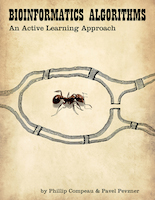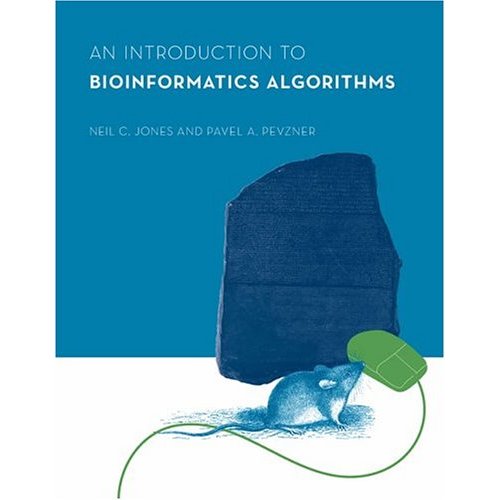Announcements
- May 2: The final exam is now online. You have 3 hours to complete it.
- May 1: The grades for Problem Set #3 and Problem Set #4 are on-line.
- April 30: The TA will be in the Sitterson Lobby from 3:00-6:00pm to answer any questions about the problem sets and grading.
- April 21: A study session to discuss the fourth problem set will be held on 4/21 in SN115 from 4:00-5:00pm.
- April 15: I have modified Problem 4 of ProblemSet3 as follows: "Assume exact matches are weighted as 0, mismatches as 1, and any introduced gaps as 1".
- April 14: The fourth and final problem set has been posted and will be due on 4/25.
- April 13: A study session to discuss the third problem set will be held on 4/15 in SN011 from 1:30-3:00pm.
- April 3: The third problem set is now posted.
- March 9: The midterm examination will be online and downloadable from this link during the normal class period. It contains a link for submitting it. You can submit as many versions as you like. Later submissions will overwrite previous ones. You must not change the filename of the notebook that you downloaded when submitting it.
- February 19: The second problem set is now posted.
- February 5: If you have already downloaded a copy of the problem set, please download it again and copy your answers from your old notebook to the this new one. The changes should not be obvious to you, but they will aid in the grading process.
- February 4: The first problem set is now posted. It is packaged as a Jupyter notebook, and must be turned in online as a notebook.
- January 27: The rescheduled Jupyter/Python study session is set for 5pm-6:30pm on January 28 in SN014.
- January 21: The special meeting of COMP 555 scheduled for 1/22 will be postponed due to the weather. I will need to cover this material before the first problem set is assigned, so I will attempt to arrange an evening meeting time early next week. In the meantime, you should install Anaconda and Jupyter Notebook. Links to instructions can be found in the Resources section of this page (below the schedule).
- January 20: We will hold an optional meeting of COMP 555 on January 22 from 1:30-3:00pm in SN011 where a brief introduction to programming in Python using Jupyter will be provided.
- January 11: First class meeting in FB007. See you there
Course Description
Computational methods are fueling a revolution in the biological sciences. Computers are already nearly as indispensable as microscopes for analyzing and interpreting biological data. As a result, two new multidisciplinary fields, bioinformatics and computational biology, have emerged. This course will explore the computational methods and algorithmic principles driving this revolution. It will cover basic topics in molecular biology, genetics, and proteomics. The course also addresses basic computational theory and algorithms including asymptotic notation, recursion, divide-and-conquer approaches, graph algorithms, dynamic programming, and greedy algorithms. These fundamental concepts from computer science will be taught within the context of motivating problems drawn from contemporary biology. Example biological topics include sequence alignment, motif finding, gene rearrangement, DNA sequencing, protein peptide sequencing, phylogeny, and gene expression analysis.
This course is suitable for both computer science and biology students at both undergraduate and graduate levels. Students who wish to take this course should have some programming experience in a modern language. Knowledge of data structures, algorithm design, and biology is helpful but not required. There will be 5 problem sets with short programming assignments, a midterm, and a final exam.
A syllabus for this offering of Comp555 can be downloaded from here.
Book, Course Information, and Prerequisites
This semester I will continue making a transition from the old version of the textbook to a new version. This time, I intend to follow the organization of the new book while incorporating materials and exercises from the old one. At this moment, I would hold off purchasing either one, until I resolve which will be more beneficial. I expect to do this by the end of the second week of classes.
Were is the new book:
 Bioinformatics Algorithms: An Active Learning Approach
Bioinformatics Algorithms: An Active Learning Approach
by Phillip Compeau and Pavel Pevzner
Active Learning Publishers © 2014, ISBN: 978-0-9903746-0-2.
And, here is the old book:
 An Introduction to Bioinformatics Algorithms
An Introduction to Bioinformatics Algorithms
by Neil C. Jones and Pavel A. Pevzner
MIT Press © 2004, ISBN: 0262101068.
| Credit Hours: | 3 |
| Location: | SN014 |
| Time: | MW 1:25-2:40PM |
| URL: | http://www.csbio.unc.edu/mcmillan/?run=Courses.Comp555S15 |
| Prerequisites: | COMP 410, Math 381, or equivalents |
Course Instructors
| Instructor: | Leonard McMillan |  |
| Office: | SN316 | |
| email: | mcmillan@cs.unc.edu | |
| Office Hours: | TBA |
Schedule
| Date | Topic | Homework |
| January 11 | Introduction (slides) | |
| January 13 | Exploring a Genome (slides) | (Video Parts 1 & 2) |
| January 18 | No Class (MLK Holiday) | |
| January 20 | Exploring a Genome (Continued) (slides) | (Video Parts 3, 4, & 5) |
| January 22 | Intro to Jupyter and Python (Location SN011) CANCELED (notebook) | |
| January 25 | Finding Patterns in DNA (slides) | (Video Parts 1 & 2) |
| January 27 | Searching for Motifs (slides) | (Video Parts 3, 4, 5 & 6) |
| January 28 | Intro to Jupyter and Python (5:00pm-6:30pm Location SN014) (notebook) | |
| February 1 | Protein Sequences and Antibotics (slides) | (Video Parts 1,2, & 3) |
| February 3 | Inferring Protein Sequences from Fragments (slides) | (Video Parts 4, 5, & 6) Problem Set #1 |
| February 8 | Scaling up Peptide Sequencing (slides) | (Video Parts 7, 8, 9, & 10) |
| February 10 | Assembling a Genome (slides) | (Video Parts 1, 2, 3 & 4) |
| February 12 | Problem Set #1 Study Session (SN011) from 1:30-3:00pm | |
| February 15 | Class Cancelled due to Ice Storm | |
| February 17 | Path Finding in Graphs (slides) | (Video Parts 4, 5, 6, 7, & 8) Problem Set #2 |
| February 22 | The Realities of Genome Assembly (slides) | (Video Parts 9, 10, 11, & 12) |
| February 24 | Comparing Sequences (slides) | (Video Parts 1, 2, 3, & 4) |
| February 26 | Problem Set #2 Study Session (SN011) from 1:30-3:00pm | |
| February 29 | Sequence Alignment (slides) | (Video Parts 5, 6, 7, & 8) |
| March 2 | Class Cancelled due to travel | |
| March 7 | Advanced Sequence Alignment (slides) | (Video Parts 9, 10, & 11) |
| March 9 | Midterm, Open Book, Open Notes, Online (Covers up to Lecture 11) | |
| March 14 | No Class (Spring Break) | |
| March 16 | No Class (Spring Break) | |
| March 21 | Divide and Conquer Sequence Alignment (slides) | |
| March 23 | Divide and Conquer (cont) and Greedy (Part1) (Part2) | (Video Parts 1-4) |
| March 28 | Genome Rearrangements (Slides) | (Video Parts 5-9) |
| March 30 | Clustering and Evolution (Slides) | |
| April 4 | Imperfect Tree Construction (Slides) | Problem set #3 |
| April 6 | Perfect Phylogeny (Slides) | |
| April 11 | String Pattern Matching (Slides) | (Video Parts 1-3) |
| April 13 | The Burrows-Wheeler Transform (Slides) | (Video Parts 4-9) Problem set #4 |
| April 15 | Problem Set #3 Study Session (SN011) from 1:30-3:00pm | |
| April 18 | Hidden Markov Models (Slides) | (Video Parts 1-5) |
| April 20 | Hidden Markov Models - Continued (Slides) | (Video Parts 6-10) |
| April 21 | Problem Set #4 Study Session (SN115) from 4:00-5:00pm | |
| April 25 | Randomized Algorithms(Slides) | |
| April 27 | Gibbs Sampling and Random Projection(Slides) | |
| April 29 | Final Exam Study Session (FB007) from 5:00-7:00pm | |
| May 2 | Final (12:00pm-3:00pm, FB007), Open Book, Open Notes, Online | |
Resources
- Download the package management system Anaconda. It will greatly simplify working with both Python and Jupyter.
- After installing Anaconda, follow the instructions for installing Jupyter Notebook.